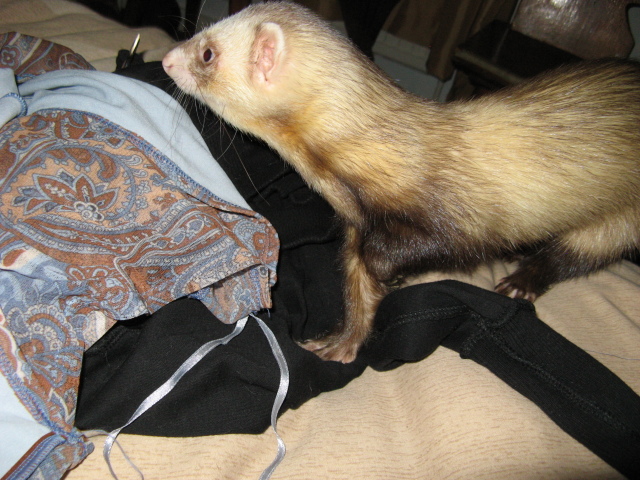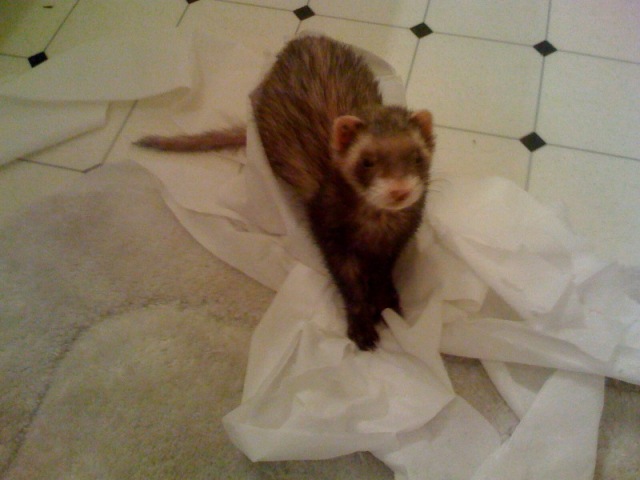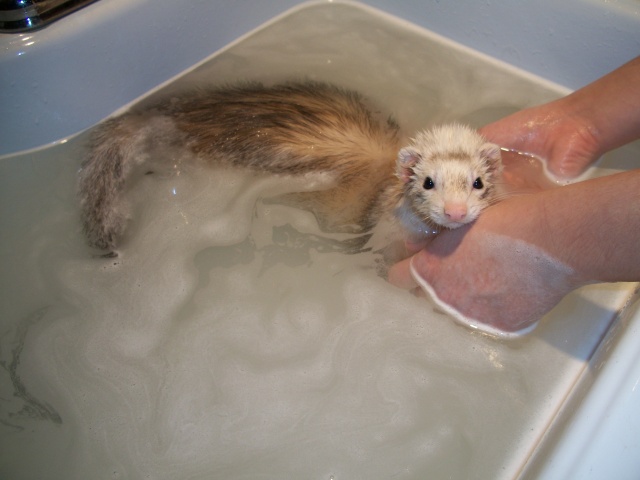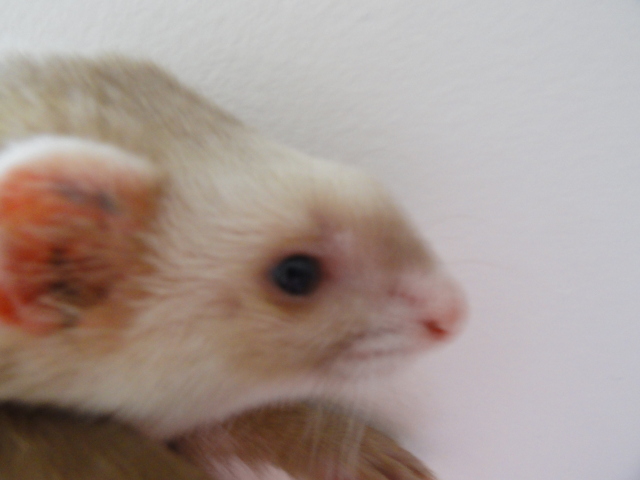Questionhi my 1 year old ferret is loosing his fur on the underside of his tale. 2 months ago him and his mate pippa escaped out of there cage in the night. sadly pippa was killed and he was missing for 3 weeks he was found and i went to pick him up from the mans house who found him(he had ferrets) he was in a terrible state his fur was full of his own dirt greasy and he was so thin all his bones were popping out and he smelled of urine. he was so happy to see me he clung on to my clothes and wouldnt let go of me. i noticed a small patch of fur missing at the end of his tale on the underside it looked like it was getting better and hes putting weight back on steadily but the baldness is spreading its now all they way up the tail now i have 5 other ferrets none of them are having any problem he isnt on his own he is now in a very large hutch with 2 females and gets plenty of excersise everyday can you help me with whats causing his fur to fall out i am very worried about him many thanks
AnswerHello Amy,
I am concerned of adrenal disease since it seems to be spreading up his tail and toward his back. This is a pretty common pattern for the disease, although it does not mean it is the only thing that can cause hair loss. It would be a good idea to bring him to your vet to rule out adrenal disease or pinpoint another cause. In the mean time, I will give you some information on adrenal disease since it is VERY common in ferrets and it is something you should be aware of.
Adrenal disease is caused by tumorous growths or hyperplasia on one or both adrenal glands, which lie above each kidney. It causes an overabundance of hormone production, such as estrogen which is the major reason for they symptoms of hair loss, swollen vulva (in females) and aggressive behavior in males. Testosterone is also produced, which can lead to the increased aggression in males. No one is certain what triggers adrenal disease, but some speculate that it is the overabundance of artificial light, early spay/neutering, diet, or genetics.
Symptoms:
Whether the tumors are malignant or benign, the most common symptoms of adrenal disease include hair loss usually beginning at the end of the tail (though it can appear anywhere on your ferret) and moving up towards the shoulders in a symmetrical fashion, muscle loss and/or a potbelly appearance, lethargy, an orange skin color and weight loss (can be dramatic). It is quite common for a ferret to loose all their fur, except for a few areas and their face. Females often develop an enlarged vulva (50%), and males experience an enlarged prostate often causing them to strain while urinating. Male ferrets can also return to intact male behavior including aggressiveness due to the increased levels of testosterone. There can also be a thinning of the pelt or brittle skin.
Diagnosis:
Ultrasound is a great way to rule out adrenal disease without jumping directly to surgery, but if the tumor is too small ultrasound may not be diagnostic. There is a blood test available, but the accuracy is about 50%. Radiographs are unhelpful in the diagnosis.
The problem can occur on either the right or left adrenal gland (or both). In the overwhelming number of cases the problem is in the left gland only (80%). Eventually, both glands are commonly involved.
The left gland is much easier to work with because it is in a fat pad above the left kidney. The right gland is much more difficult to approach because it is under a lobe of the liver and is attached to the posterior vena cava, the main vein that returns blood from the back end of the body to the heart. In most surgeries we remove the diseased left gland, leaving the right gland alone. If the problem is in both glands we remove part of the right gland in addition to all of the left. Complete removal of both glands can cause serious complications. Sometimes removal of only one of the glands can cause a problem if the remaining gland can not make up for the loss.
Treatment:
Adrenal disease is 100% fatal IF untreated. The best method is surgery to remove the affected gland(s). In a young ferret, this will likely be the best option. In older ferrets, or those that cannot go through surgery, there are medications (Lysodren, Lupron, melotion injections, etc) that can help slow the progression of the disease and promote fur growth. Medication will NOT stop the condition, but it will allow a longer more comfortable life. Adrenal disease is VERY painful and if left untreated the ferret will die a terrible death. If surgery is not an option, the ferret will require Lupron and/or melatonin injections for the remainder of its life.
Complications with surgery:
Unfortunately, it is quite common after the removal of a gland to have the other gland become affected, and to a lesser degree to have them both affected at the same time. If both are affected together, the recommended protocol is to remove the gland that's worst first and then remove the other one 1-2 months later to avoid Addison's crash.
When both glands are removed, the ferrets body stops producing the needed hormones at once, which can send the ferret into shock, Addison's Disease and possibly death. It is very possible that some ectopic tissue remains from surgery, producing enough natural hormones on their own without drug intervention. The only way to know for sure is through frequent Chem Panels to monitor the levels. Your ferret will most likely need to be given Florinef (pill) daily for life or an injection of Percortin monthly for life. Blood tests are vital at the beginning to establish the correct drug dosage, and should continue quarterly thereafter to ensure all is well. A majority of the vets prefer the Florinef for the easier flexibility in dose changes and less visits for you to the office.
When both glands are removed, it is very common to immediately administer the Florinef or Percortin to avoid Addison's shock due to the immediate loss of needed hormones not being produced. Constant and continual monitoring by blood tests are vital to the health, survival and well-being of your ferret.
Prognosis:
Most ferrets that have this surgery regain hair growth and do well for years. Even though most adrenal tumors are benign, recurrence can occur. a tumor can reappear in the adrenal gland that remains after surgery, and symptoms can recur. Injection therapy (Lupron) instead of surgery will only mask the symptoms and not stop the progression of the disease.
I hope this answer helps. If you have any other questions do not hesitate to ask.
-Cindy P.

 I think my ferret is to thin?
Question
Photo of Ferret
Hi
I think my ferret is to th
I think my ferret is to thin?
Question
Photo of Ferret
Hi
I think my ferret is to th
 Elderly ferret
Question
Booger
Hi,
I rescued an older ferret named Bo
Elderly ferret
Question
Booger
Hi,
I rescued an older ferret named Bo
 Poisonous outdoor plants.
QuestionHi, Cindy. I had a question thats been spinning
Poisonous outdoor plants.
QuestionHi, Cindy. I had a question thats been spinning
 Just some basic help questions
Question
Benny!
Hi!
My ferret Benito (we just call him
Just some basic help questions
Question
Benny!
Hi!
My ferret Benito (we just call him
 Bump on the noggin
Question
Bump above the eye
Yesterday,my ferret was fin
Bump on the noggin
Question
Bump above the eye
Yesterday,my ferret was fin